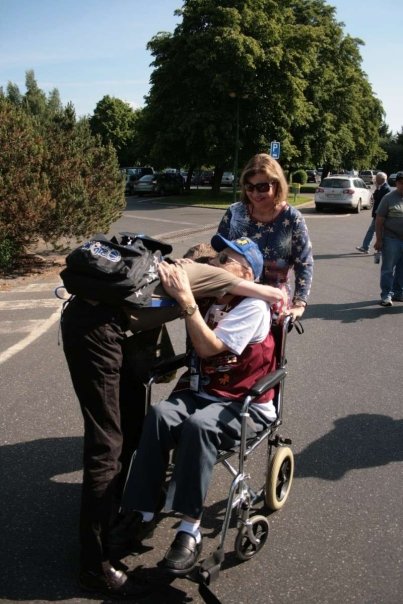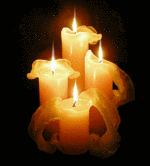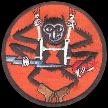
Howard R Huebner
|
IN MEMORIAM |
|
It's with great sadness that I must inform you of the death of Howard Huebner occurred Friday, 8 february 2013. He considered me like his "Grandson". And he was my "Grandfather"! Although, I was hoping to see you again, I still had the chance to hold you in my arms in June 2009. I will miss you Grand Father! I'll never forget! Rest in Peace with your brothers in arms! |
All my thanks to Howard for answering all my questions as for his kindness and his availability. Thanks also to Célia and Virginie for the translations and always being present.
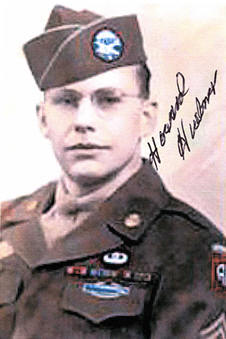 <- Howard en 1945 et en 2009 ->
<- Howard en 1945 et en 2009 ->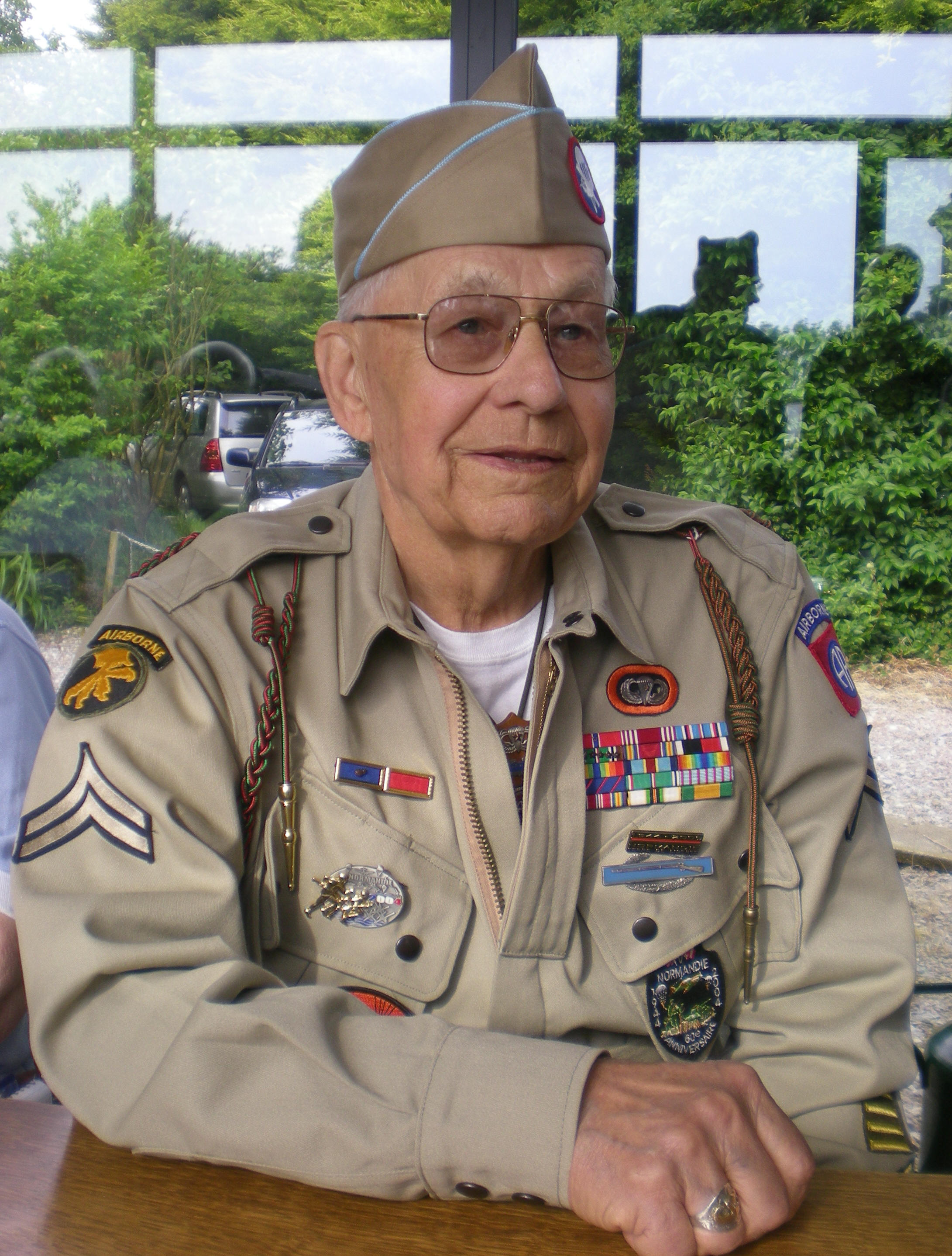
Introduction
Howard R. Huebner was born in Saginaw in Michigan on May 19, 1923. His mother was called Martha Raese and his father Charles C. Huebner. He first studied to St Paul' S Lutheran School during 8 years. Then in South Intermediate School for 1 year and then at Arthur Hill High School for 3 years. Heís been graduated in June 1941.
At first, He was an apprentice mason in Ready Mix Concrete Company from Saginaw.
"I worked for the Ready Mix Concrete Company in Saginaw for 35 cents an hour doing concrete work setting forms, pouring and finishing concrete."
His friends worked with the GENERAL MOTOR CAR Co and earned 1$ an hour. He thus left his job of apprentice for the other one in DOW CHEMICAL Co at about 150 miles from Saginaw. This job was exactly located on Lake Michigan.
"I bought a car, a 1935 Cadillac convertible with a rumble seat white wall tires, red leather interior, doors opened on the front, wheel wells on the fenders, white wall tires with spoke wheels, a radio and heater and a spotlight. It was a sporty car (I wished I had it today). I think I paid $250 for it back then."
"I drove up to Ludington and found a place to stay in a private home, my room and board were $12 a week, with a pack lunch taken in the morning for my noon meal. The people where I stayed with were retired school teachers. My wages were $1.25 an hour, a little more than my buddies were earning. No more complains on what I was earning an hour from then on."
Then, after 4 months, Howard came back home, in Saginaw. He changed his job as he left for OWEN HEARTS & KIMBEL, which was with 25 miles from his place. It was a large power station. He earned 1$50 an hour.
"I sold my convertible to a friend and bought a 1939 four door Pontiac Chieftain for $450. We had gas rationing and I could get all the gas I wanted because I was working on for the government, and I pooled with other workers from Saginaw."
In January 1943, he accepted his convocation.
"But one day in January 1943 I got a card in the mail from Uncle Sam, saying I need you!"
He left Saginaw for Detroit to pass a medical examination. Over there, he got his uniform, he had to send back home his civiliansí clothes.
Training
After being called by Uncle Sam, Howard went to Custer Camp in Michigan in February 1943. He was then 19 years old. His number was Ser#36569543.
"We were given clothes and I was sent to Camp Wheeler, Georgia from army basic training. After eight weeks of training they asked us if anyone wanted to join the paratroopers. Well there was the jump suit, boots, extra money and the rest. I joined!"
Desired Ca family to make him change his mind!
"When I wrote home to my mother and dad, they thought I was nuts and so did all the people my mother talked to. I got lots of letters from the neighbors telling me not to be a paratrooper. Well I told them, someone had to do it."
He left Fort Benning to Georgia for a 4 weeks formation. The training was hard, 8 hours a day, a mix of races, climbing along a rope of 9 metres, jumping from high tower to simulate a parachute jump.
"After strenuous training of callisthenics eight hours a day, you ran from one place to the other, from time to time for play. We climbed ropes 30 ft. high. We jumped out of mock towers into saw dust piles as simulated jumps. We twirled Indian pins about 1 Ĺ lbs., until your arms almost dropped off. When you slowed down, the Sgt. who was in command over all no matter if you were a colonel or anyone else, would say give me the GI laugh. A lot of nice words were said under our breath to him. Then the Sgt. stood on a platform about four feet high, so they could see us. I think we were in groups of about thirty fellows. Four weeks of training if you passed along with five jumps, and then I was send to Alliance, Nebraska to the 507th."
Then, he was sent to Alliance in Nebraska with the 507th Parachute Infantry Regiment.
"I believe it was in June when I hooked up with the 507th. I was assigned to C. Company and after training on the rifle range I was designated to be a machine gunner. While on the rifle range, I shot the M1 Rifle from fifty yards to one thousand yards, I shot a ninety-eight out of a possible one-hundred bulls eyes and another fellow shot ninety-nine. We both got three day passes to Denver, Colorado for our achievement."
"I Was a machine gunner who used the 1919A4ó30 Caliber I also used the BAR at the times we used what ever was handy for the situation."
They still made some jumps of training and passed also two weeks in Black Hill, training to climb the mountain. Then, they returned to Alliance. There they received a two week permission.
"We were all glad to get home !"
On the way back to Alliance, they were sent by train to the Shanks Camp in New York. They stayed there only few days. They left New York by boat to get to Ireland. There, they first of all practiced climbing cliffs along the coast. After Ireland, they were sent in Nottingham, in England in an old castle: Barton Stacey.
"We set sail and landed in Ireland where most of the paratroopers went first. We trained a lot for cliff climbing along the coast, and a lot of hiking to keep us in shape and double trimming."
Normandy
"I am a Paratrooper! I was 21 yrs old when we jumped over Normandy."
Howard, as all the paras of his company knew the area because he has studied it on models in tubs of sand.
They then had to draw it from memory. Naturally, once above the zone, things had a little bit changed.
In the plane, Howard observes the landscape:
"My thought when going over the English Channel to France. It was beautiful to see the Dover white cliffs and the ships below but when we hit the coast of France we couldnít see any thing because of the fog. Then inland we could see them shooting at us. All I wanted to do was get out of the plane and be on the ground."
"Most of us missed our drop zone in miles. As we were over our drop zone there was a downed burning plane. Later I found out it was one of ours. The flack was hitting our plane and everything from the ground coming our way looked like the Fourth of July."
"When I hit the ground in Normandy, I looked at my watch. It was 2:32 AM, June 6, 1944. I cut myself out from the drop, and the first thing I heard was shooting and some Germans yelling in German"
"There were four of us from my stick that got together, I didnít see any more of them."
The 507th was supposed to land within 16 miles inside the grounds. Instead of that, they landed over 4 miles beaches of Utah in a small village named Pouppeville. Howard landed with surroundings 984 yards of a French farm being used as a dwell for Germans and with 65 yards of the river, in a flooded zone.
"If I would have landed in the water, I may not be here today as I canít swim. A lot of paratroopers drowned because of the flooded area.
I crawled to the edge of the flooded area alongside of a tree to get my bearings. I knew I was in the wrong area a long way from our drop zone. About a half hour later someone came toward me from the direction I had landed in. By the morning light I could see his helmet and knew he was an American."
While the day was rising, they made Poupeville safe with paras of the 506th of the 101st Airborne. Until the moment where the first American tank coming from Utahbeach arrived. (it was 12 :00)
"We gathered the wounded and dead soldiers and had about seventy-five to one-hundred prisoners, and went down to the same road. It seemed like two to three miles to the beach."
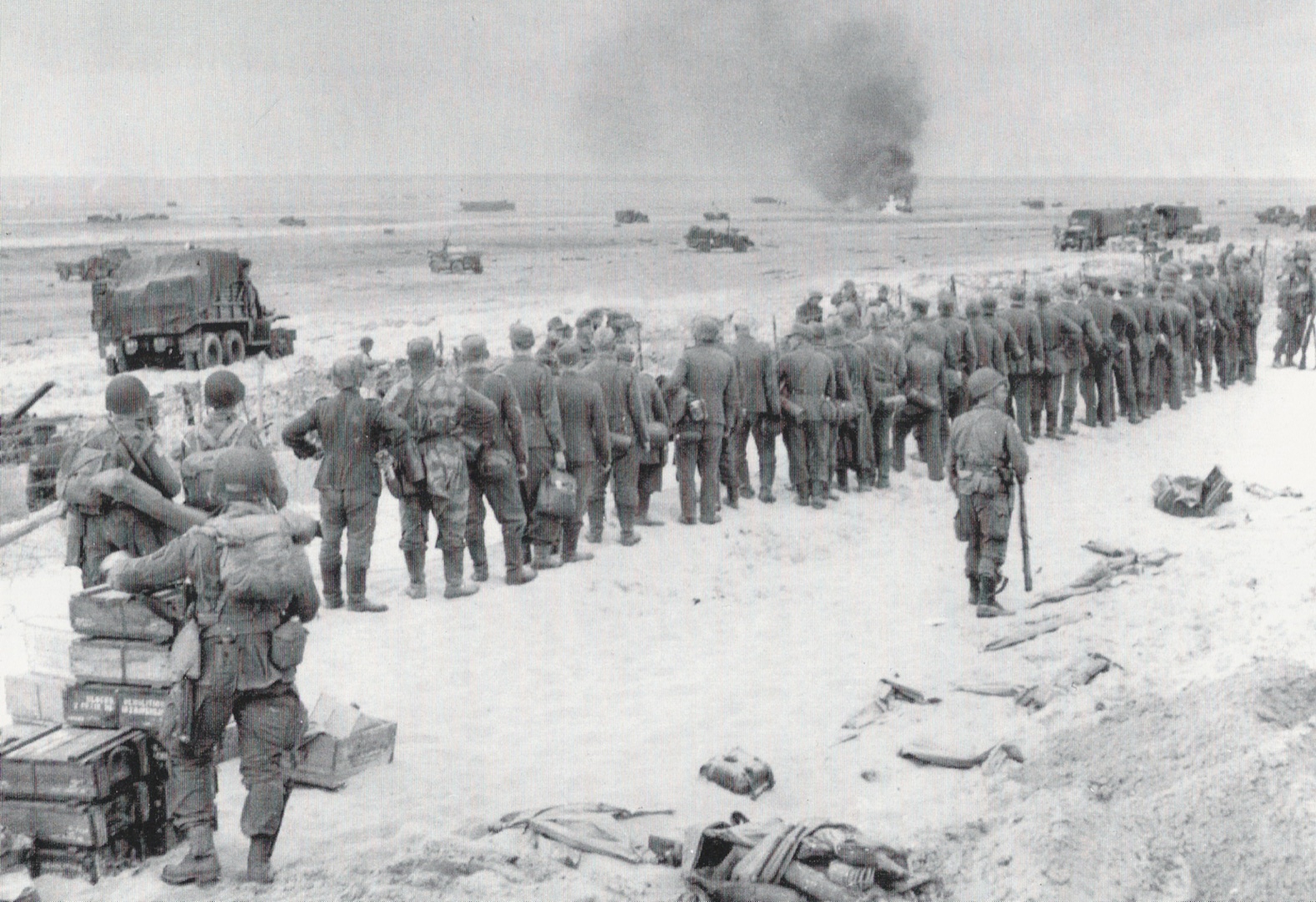
This photo was taken on Utah Beach, June of 1944. These are German prisoners captured by the 506th, 101st Airborne Division. I Howard, Huebner, landed in the area and fought with them. I am standing at the head of the prisoners.
"It was something to look over the water and see all the ships. It looked like a bunch of corks in the water. The equipment that had already been put ashore was awesome."
"I remember a truck coming up on the beach loaded with ammunition and a German 88 shell hit it. It was the loudest noise I have ever heard."
Howard remained on the beach during the night, and the next morning he left again to look for his unit. One or two days later, he found part a of his company. They were ready to go to La Fière on June 9, 1944. They raised the paras of 505th PIR. The general Gavin gave the command of C Company to Captain Robert Rae with the mission of taking the roadway. The fight of 507th PIR began on June 9 with the men of 325th GIR.
This battle was already started with the 325th GIR.
During the movement towards La Fière, on the roadway, the company passed by an orchard. The troop made a break along a hedge border. Howard tested side of the hedges. Suddenly there was a slapping. A bullet torn up his pants from the back to the front. But by chance not a scratch!
"I heard nothing and saw nothing, but I sure got stung on the rear. Whether by accident or choice, a stray bullet tore up my pants and went under my butt and out of the other side. The fellow that was sitting about eight feet from me heard it go past him. I jumped up and dropped my pants, no blood, just a pair of shot up pants"
"I often wondered what would of happened if that bullet would have hit me in the hip, but I guess the Good Lord was with me that day as He has been since, and I hope He always will be."
Arrived on the front line the men of the 507th raised the men of the 505th. They had to give the attack in order to control the roadway and to maintain it accessible.
"The night before the attack on June 8, 1944, about eight of us from the 507th waded across the swamp, as it was called by the French people. We went up into German territory to see what munition they had. We could hear the Germans talking on one side of the hedge row and we were on the other. We were only there to survey what they had."
"The next morning our company commander Captain Robert Rea, got orders from General Gavin the 82nd Airborne commander, to take the bridge and causeway. The 505th had knocked out two tanks on the causeway. We had a little cover for a few feet and then nothing but sure luck and the good Lord with us, but we made it across. It was running and firing. You see your buddies lying there and you canít help them, but we were trained to kill or be killed and thatís what took us across the causeway; guts and determination."
"It cost about 500 lives to take a half mile of road. A very high price to pay."
"It was one of four roads from Utah Beach to high ground to bring in supplies and troops."
The last battle which the 507th delivered was in Vindefontaine. They attacked the village in the early morning. They had to push back the Germans and to make the village safe. To join the
(face ??), they passed by the road then, they followed the way bordered of hedges in the field."While moving toward the front line I remember going up a lane lined with German black bicycles. The Germans used these to get to the front lines and transportation."
"I was the last fellow in the column and Sgt. Brothers was ahead of me. As we walked along I heard some noise behind me. When I turned it was a German soldier with both hands above his head, as well as his gun. I turned and told Brothers, ĎíLook who is behind meíí. He said shoot so and so, I said no and took his gun, emptied it and threw it in the brush and frisked him. Later I had to take him back to the battalion H.Q. By then it was dark. What ever happened to him, I donít know."
"When I got back to the company, a Lieutenant came over to me and told me to go to B Co. area and take over the machine gun on the front, which was set up in a German foxhole. An American was hit in the face by a piece of shrapnel and his face was wide open from skull to neck. In the other corner was a dead German."
<- Ron Bonell
"The American was a friend of mine named Ron Bonell."
"In the United States Army as a paratrooper stationed in Alliance, Nebraska with the 507th Parachute Infantry Regiment, I spent two weeks in the Black Hills in South Dakota near Deadwood. When we returned to the camp we were all given a two week permission in October of 1943."
"I lived in Saginaw Michigan. I took the train from Nebraska to Detroit, Michigan. While I was waiting for a bus to Saginaw, I met another paratrooper, Reinold Bonnell from Hemlock, Michigan."
"We traveled home together and had some good times during our stay. Unfortunately we had to return the 15th of October, which is the opening day of the pheasant season in Michigan. Well, Ron and I opened the season on the 14th. We only took two birds apiece, the limit."
"When we got back to camp Alliance, Nebraska, we were told to pack our gear and get ready to move out. It took several weeks then we headed for New York. I managed to see New York from the Empire State Building. We had to take the ferry across the Hudson River. One of our buddies lived in the Bronx where we spent time."
"While going across the Atlantic, my friend Ron or Red as we called him, told me his girlfriend gave him a wrist watch and that if he got killed and I found him, I should take it, and if I lived to send it back to her. We landed in Ireland and we were stationed at Port Rush, Ireland. We spent Christmas there. I cut a branch off a tree and hung tin foil from cigarette packages on it and tin cans, you name it. It didnít look too bad, but it was Christmas."
"When we left Ireland, we went to Nottingham, England, where we trained and stayed until D-Day June 6, 1944. It was a day we all looked forward to for because we knew we were there for a reason, and that is what we trained for. We both made the jump but I didnít see Ron until the 15th of June, a day I will never forget."
"When I got back to the company, they told me to go over to B Company and to take over the machine gun. I said Ron was their machine gunner, why canít he? ( I was machine gunner also) I was from Co C going into Co B."
"When I got there, they set the machine gun outside of this German dug foxhole, approximately eight foot long and four foot deep. Ron was in one corner, a piece of shrapnel had hit him in the face and tore it open from skull to his throat. I tried to take the watch off but I couldnít. I crossed his arms and said God bless you. In the other corner was a dead German soldier."
"That night I will never forget as I stayed there guarding the front line and the alive Americans as they slept, and dead Americans and Germans."
The 507th went back to England after 33 days of combat without stopping.
"The 507th went in with about 2000 men and came out with about 800. My company, C Co. left with about 75 out of 230 men. We the 507th had the worst drop of all paratroopers on D-Day. Why? I guess because we were the last ones and the fellows before us had stirred up the bees (the Germans)."
"We, the paratroopers of the 101st and 82nd Divisions, did not have any replacements for the thirty-three days we fought in Normandy. And the food we ate, we had to find or get from the French people. We learned to live off the land."
End of War
After Normandy, Howard as all the 507th went back to England. There, they were sent to the west of London to Barton Staccey and Tidworth. The 507th was assigned with the 17th Airborne which had just unloaded in England.
"After we went back from Normandy in July of 1944, I was promoted to corporal and we had to take care of business of sending personal things home of the fellows who were killed, and send personal things to the fellows who were in the hospitals, and take care of our equipment."
They trained and made some jumps.
"It was a gusty, windy day and I thought I was going to make a good landing when a gust of wind caught me and threw me up and my chute hit the ground. Four moths later I left the hospital after three bones healed in my right leg."
507th PIR did not participate in the campaign of the Ardennes. It was stationed in Chalon in France.
Loan ??? to be jumped on Germany."I was ready to go and the company commander told me I couldnít go, as I had just come back from the hospital. He told me what to do with the mail and other things as I was (going) to be the acting company commander. Well, thatís what he thought."
Howard spent besides the order that it was given to him to stay behind.
"I told another fellow who had come back from the hospital, to do what I was told to do by our company commander."
Howard climbed on a jeep and entered to Germany by a bridge on the Rhine which the troops of the genius had built. And he caught up with his company. Naturally he got told off by the commander of the company.
"The next day the jeep and I caught up with our company. Well, when the company commander saw me he couldnít believe it.
He said:
- ííHuebner, you so and so, you're going to get a General Martial Courtíí.
I spouted back and said do what you have to do, I trained with these fellows, I fought with these fellows and I will die with these fellows. That was that and we went on doing what we were trained to do, fight for our country."
He still fought, going through the valley of the Ruhr, cleaning cities and collecting ammunition and weapons from the enemy.
At the end of the war, Howard was in Essen in Germany.
We were in May 9, 1945. He was sent to 505th PIR of the 82rd Airborne which left for Berlin as troop of occupation. He was named Staff Sergeant in Quatermaster Department. The 507th PIR with the 17th Airborne returning to the United States to be deactivated there.
"The war ended on May 9, 1945, and we were in Essen, Germany. I was sent to the 505th Parachute Infantry, 82nd Airborne Division, and on to Berlin for occupation duty. I was made Special Staff Sergeant without pay. I had to wear the stripes."
"Then the Army went by a point system. I think if you had 80 points going by service time war duty and overseas, time you could be sent back to the States. I was short and sent to the 505th. They also sent the 507th Parachute Infantry and the 17th Airborne Division to the States and were deactivated or put out of service of the United States Army. Some fellows with less time in the service and less points were sent home. So I went to Berlin Germany for 7 months."
"I served in the army paratroops from 1943 to 1946, and then was honorably discharged."
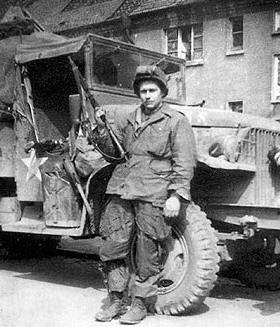 <-
Howard Huebner in Essen, Germany 1945
<-
Howard Huebner in Essen, Germany 1945
Howard in Berlin with the 505th PIR,
1945 -> 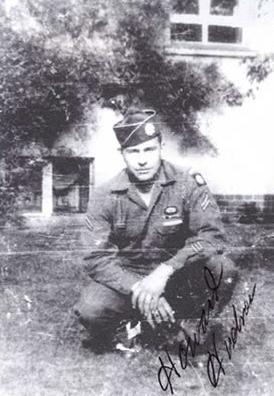
Démobilized
Howard was demobilized in January 1946. He went back home in Saginaw, Michigan.
"I met my wife in 1946 on a blind date. We went together for 4 years and then got married in april 1950."
He started working as a car salesman during 5 years. Then during 12 years and half, he worked with the Police of Saginaw. Then, he worked as a master carpenter in the school public system of Saginaw, in 42 establishments. He retired in 1988 after 12 years the school system.
"My wife and I have traveled and have been in all but one province in Canada and all but one state in the United States. I have not been in Oregon yet. We have traveled to France three times and Belgium, Holland and England."
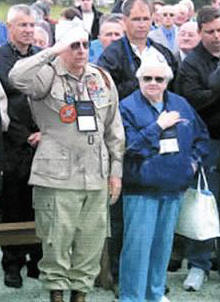 <-
Howard and his wife Betty in Normandy on june 6, 2004
<-
Howard and his wife Betty in Normandy on june 6, 2004
Howard spends these days in calm and peace, he fishes, he goes hunting and plays cards.
"I worked hard all my life and retired in 1988 and havenít worked since. Just do what we like to do."
Howard and Betty had two children, Pamela and Rogers and 4 grand children. Since 1995 Howard and his family live in Florida. He lived a small house at Saginaw.
"The cottage was on a lake and in a pretty setting with clean, clear water. We miss it but as life goes by you have to give things up sometimes that you love dearly. And with me my family comes first."
From Germany he brought back some memories:
"I sent some German things home German Army belt and buckle. German typewriter. Some German spoons a few guns old 9mm pistol. German officer boots and pants and a lot of other small things."
Howard Huebner has been decorated with Bronze Star.
"There were about 160 from our Company who got the Bronze Star. But after the war, the Government said every soldier that had a Combat Badge got a Bronze Star. I got mine in 1994, I think it was."
"Why did I do this? Only for the love of my country, my buddies and friends of the 507th Parachute Infantry Regiment in WW2."
"The soldier buddies and the people that I have met in Normandy, France. All I can say is that they are so gracious to the soldiers that were there during the liberation of their country. And I can say I was one of the fellows and darned proud to have been part of it."
Meeting of the Members of the C Company of 507th PIR on August 11, 2006
June 6th, 2009, on the occasion of the 65th Anniversary of the Landing of Normandy ( D-Day), Howard Huebner was decorated by an officer of the French army of the Legion of Honour, the highest French decoration attributed for one person foreigner.
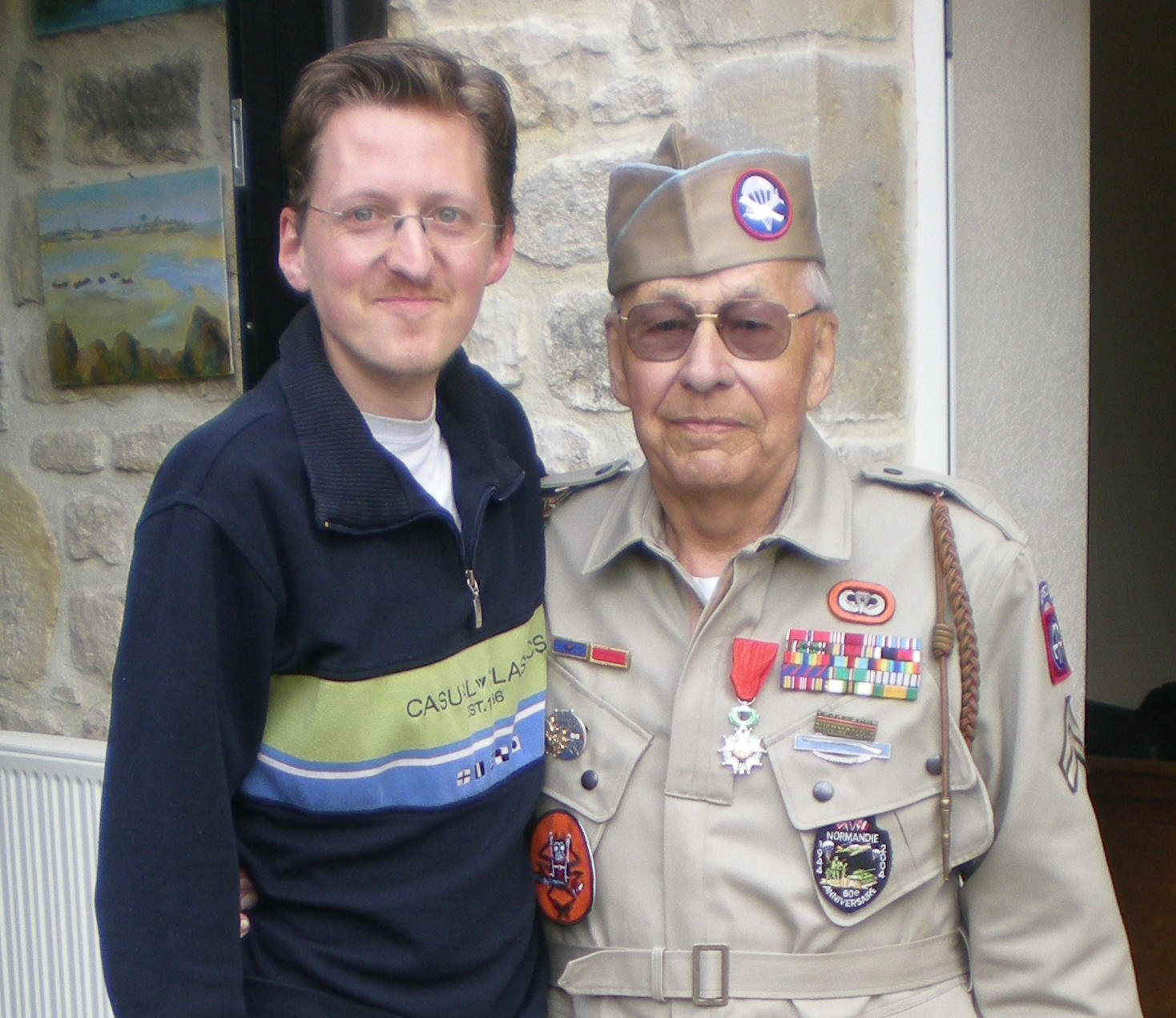
Howard and me in the 65th birthday of the D-Day.
He is decorated with the French Legion of honor.
